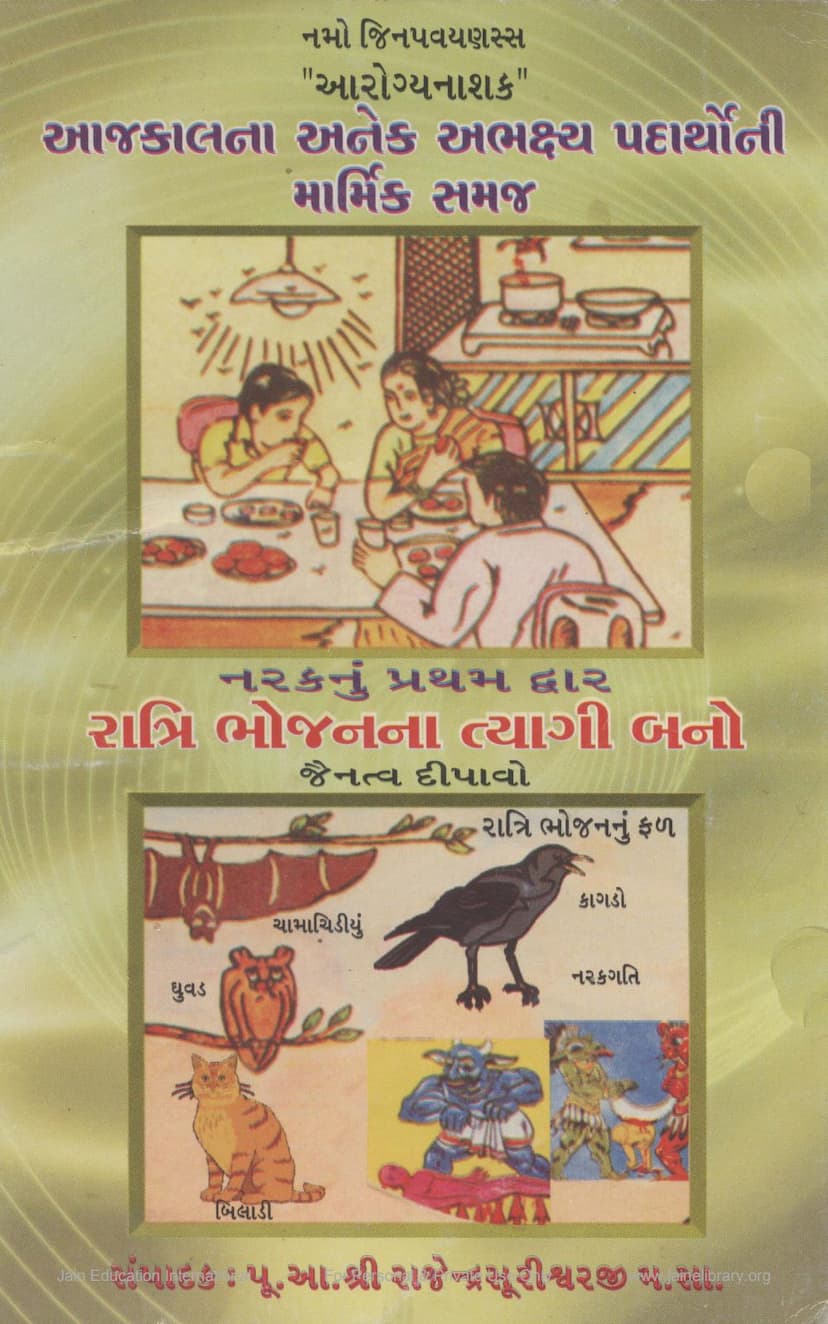Aaj Kal Na Anek Abhakshya Padartho Ni Marmik Samaj
Added to library: September 1, 2025

Summary
Here's a comprehensive summary of the Jain text "Aaj kal na Anek Abhakshya Padartho ni Marmik Samaj" by Rajendrasuri, based on the provided pages:
Core Message:
The book strongly advocates for the abandonment of night-time eating (Ratri Bhojan) and highlights the adverse effects of consuming various "Abhakshya Padartho" (forbidden or improper food items), both from a health and a spiritual Jain perspective. It emphasizes that these practices lead to physical illness and spiritual downfall, ultimately resulting in suffering in future lives.
Key Arguments and Themes:
-
The Prohibition of Night-time Eating (Ratri Bhojan):
- Health Perspective: The text repeatedly stresses that eating after sunset is detrimental to health. The digestive system slows down at night, leading to indigestion, stomach problems, and a host of other ailments affecting eyes, ears, brain, teeth, and overall bodily functions. Doctors and medical science recommend a 3-4 hour gap between dinner and sleep for proper digestion. The presence of sunlight is crucial for digestion as it provides necessary oxygen. The stomach's "lotus" closes at night and reopens at sunrise.
- Spiritual/Jain Perspective: Night-time eating is considered a major sin in Jainism due to the destruction of countless subtle organisms (jiv). It is likened to "hell's first highway" and associated with negative rebirths (Narakgati). Even animals and birds avoid eating at night.
- Scientific Basis: The book draws parallels between ancient Jain scriptures and modern scientific understanding, highlighting that the wisdom of avoiding night-time meals is scientifically validated.
-
Widespread Adoption of Night-time Meal Abstinence:
- The book proudly mentions that various Jain Sangh (communities) across India, including Delhi, Mumbai, Surat, Vadodara, Rajkot, and others, have taken a resolution to stop night-time meals and receptions at weddings and other functions.
- It calls for a global movement to ban collective night-time meals and encourages readers to commit to this practice personally and encourage their communities.
-
Identifying and Avoiding "Abhakshya Padartho" (Forbidden Foods):
- The text lists and explains numerous food items that are considered "Abhakshya" according to Jain principles, often due to the inherent violence involved in their production or consumption. These include:
- Roots (Kandamool): Potatoes, onions, garlic, carrots, radishes, etc., are extensively detailed as being laden with countless microscopic organisms and are considered tamasic (qualities of darkness, inertia).
- Unsanitary/Impure Foods:
- Eggs: Mentioned as a primary example of cruelty and a source of disease.
- Alcohol (Madira): Linked to violence, anger, and societal destruction.
- Meat (Mans): Highlighted as a gross violation of Ahimsa (non-violence), leading to severe karmic consequences.
- Honey (Madhu): Considered impure due to the involvement of countless insects and their larvae.
- Certain Fruits and Vegetables: Those with numerous seeds (e.g., figs, pomegranates) or those that are easily perishable or fermented are listed as problematic.
- Processed and Packaged Foods: A significant portion of the text is dedicated to detailing the harmful ingredients and practices involved in modern processed foods, including:
- Refined Flour (Maida): Its production process involves the killing of insects.
- Jelly, Ice Cream, Chewing Gum, Toothpaste: Often contain gelatin derived from animal bones.
- Sandwiches, Mayonnaise, Butter: May contain animal products or be prepared with unhygienic practices.
- Cheese: Often uses rennet from calf stomachs.
- Soft drinks, Noodles, Soups: Contain artificial colors, flavors, and animal extracts.
- Canned Foods: Risk of botulism and harmful preservatives.
- Artificial Sweeteners and Colors: Mentioned as particularly dangerous, with potential links to cancer and developmental issues in children.
- Synthetic Milk: Described as being made with dangerous chemicals and detergents.
- Contaminated Food: Eating food that has been exposed to insects (flies, ants, spiders), or has fallen on the ground is strictly forbidden due to the introduction of pathogens and harmful organisms.
- Substance Abuse: Alcohol, tobacco, and other intoxicants are condemned for their negative impact on health and spiritual progress.
- The text lists and explains numerous food items that are considered "Abhakshya" according to Jain principles, often due to the inherent violence involved in their production or consumption. These include:
-
The Importance of Dietary Purity (Aahar Shuddhi):
- The text emphasizes that pure food leads to a pure mind and a virtuous life. It links diet to mental state, character development, and spiritual well-being.
- It promotes a simple, sattvic (pure, harmonious) diet.
-
Social and Communal Responsibility:
- The book calls upon community leaders, trustees, and members to actively promote the principles of avoiding night-time meals and consuming only pure foods.
- It suggests passing resolutions within communities and imposing penalties on those who disregard these principles.
- It criticizes the use of the term "Jain" for commercial purposes on food items that do not adhere to strict Jain dietary laws.
-
Consequences of Ignorance and Indulgence:
- The book paints a grim picture of the consequences of disregarding these dietary principles, including:
- Physical Illness: A wide range of diseases are attributed to improper eating habits.
- Spiritual Degradation: Leading to rebirths in lower realms (Niraya/Nigod) with immense suffering.
- Moral Corruption: Indulgence in forbidden foods is linked to increased anger, lust, and a decline in moral character.
- The book paints a grim picture of the consequences of disregarding these dietary principles, including:
-
Call to Action:
- The book encourages individuals to:
- Make a personal commitment to avoid night-time meals and forbidden foods.
- Educate themselves and others about these principles.
- Influence their families and communities to adopt these practices.
- Support initiatives that promote dietary purity and abstinence from night-time eating.
- The book encourages individuals to:
In essence, "Aaj kal na Anek Abhakshya Padartho ni Marmik Samaj" is a comprehensive guide that blends health advice with Jain spiritual teachings, urging readers to adopt a pure and mindful approach to food consumption, with a particular focus on abandoning night-time eating, to achieve both physical well-being and spiritual liberation.